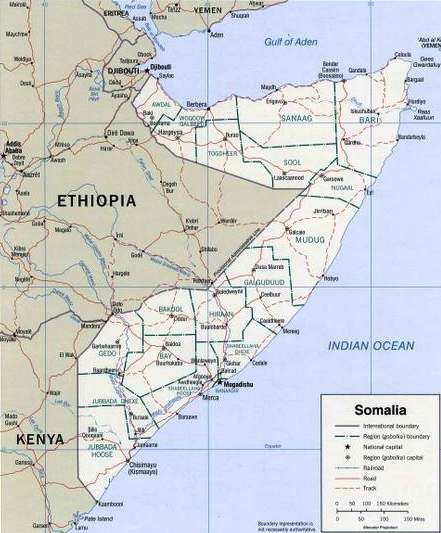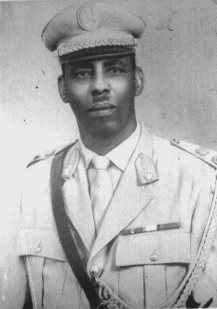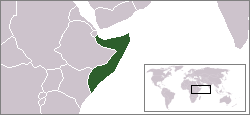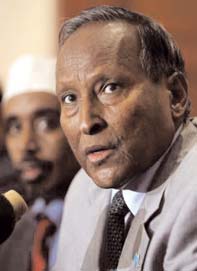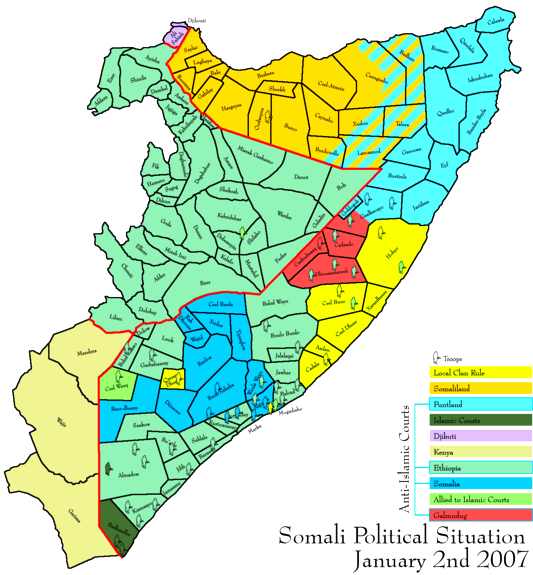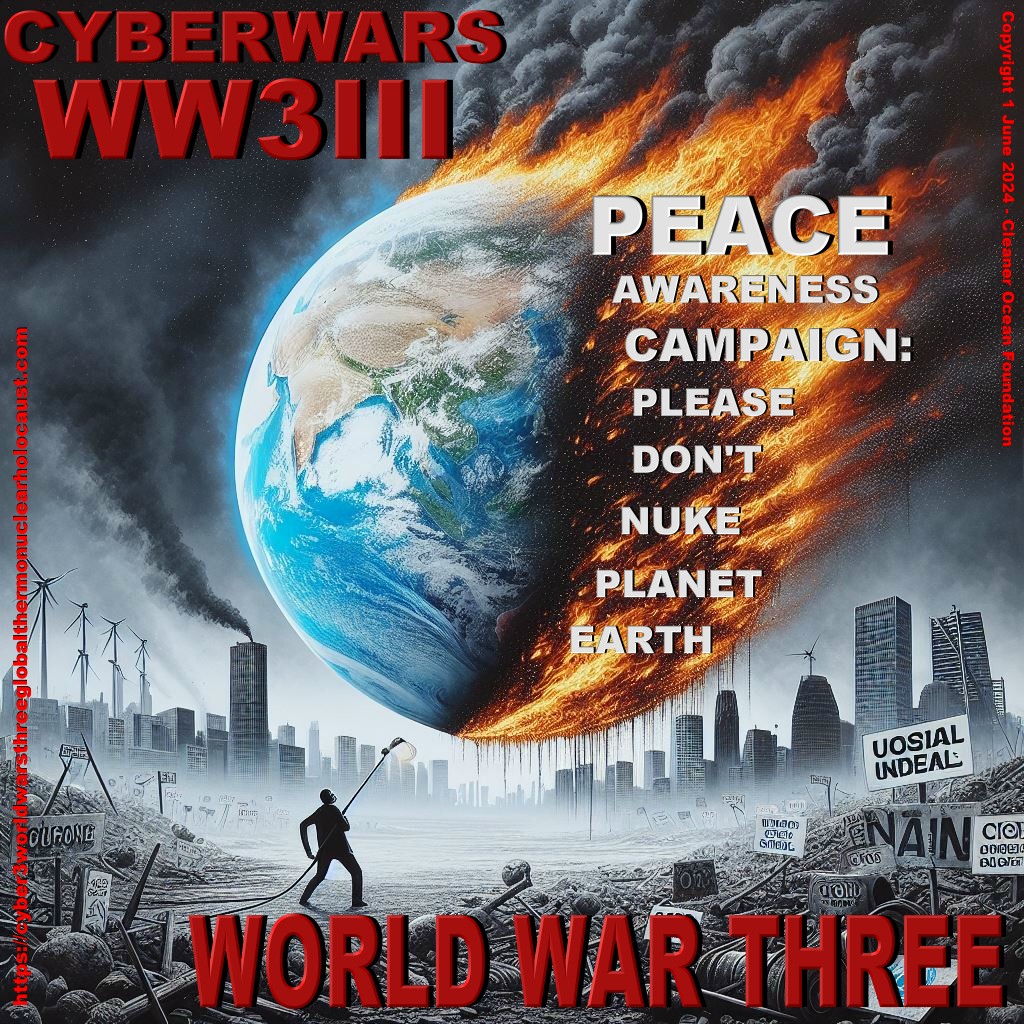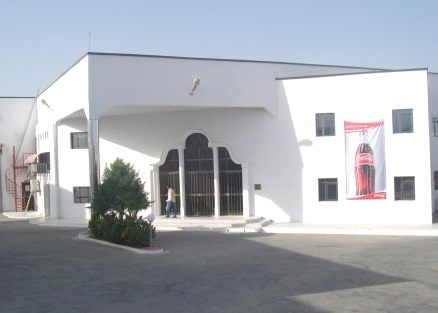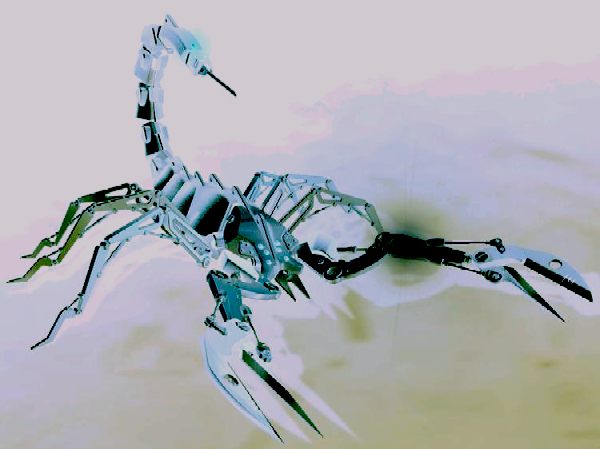|
SOMALIA
Please use our A to Z INDEX to navigate this site
|
||||||||||||||||||||||||||||||||||||||||||||||||||||||||||||||||||||||||||||
|
Somalia (Somali: Soomaaliya; Arabic: الصومال, officially the Somali Republic and formerly known as the Somali Democratic Republic, is located on the Horn of Africa in East Africa. It is bordered by Ethiopia to the west, Djibouti to the north-west, Kenya on its south-west, and the Gulf of Aden on its north, and the Indian Ocean at its east.
The Somali state currently exists solely in a de jure capacity; Somalia has no recognized central government authority nor any other feature associated with an established independent state. De facto authority resides in the hands of the governments for the unrecognized entities of Somaliland, Puntland, the Supreme Islamic Courts Council (SICC) and the United Nations-recognized, interim Transitional Federal Government (TFG) until recently just in Baidoa about 260 kilometers north-west of the capital Mogadishu. Violence has plagued Somalia since warlords ousted the former president, Mohamed Siad Barre in 1991.
Somali-inhabited lands, 2 January 2007
History - Pre-colonial times
Somalia has been continuously inhabited by numerous and varied ethnic groups, but mostly Somalis, for the last 2,500 years. In the early medieval period (A.D. 700–A.D. 1200), Islam became firmly established especially with the founding of Mogadishu in A.D. 900 The late medieval period (A.D. 1201-A.D. 1500) saw the rise of numerous Somali city-states and kingdoms, most notably, the Sultanate of Adal. The Ethio-Somali Wars of the late 15th century marked a turning point in Somali and East African history. The conquest of Ethiopia by Somali Sultan Axmad Gurey of Adal ended a century of Ethiopian expansion and occupation of various Somali lands. It was when the Portuguese came to help the collapsing Ethiopian empire that the victorious army of Axmad Gurey lost the war. The Sultanate of Adal soon declined and collapsed after defeat and death of its king. The early modern period (1501-1883) in Somalia saw the growth and gradual rise of many successor city states such as the Sultanate of Geledi and the Sultanate of Hobyo. The modern period began when the clouds of colonial conquest gathered in 1884
Colonial period
The year 1884 ended a long period of comparative peace. At the Berlin Conference of 1884, the Scramble for Africa started the long and bloody process of the imperial partition of Somali lands. The French, British and Italians came to Somalia in the late 19th century.
The British claimed British Somaliland as a protectorate in 1886 after the withdrawal of Egypt, which sought to prevent European colonial expansion in Northeast Africa. The southern area, claimed by Italy in 1889, became known as Italian Somaliland. The northernmost stretch became part of the French Territory of Afars and Issas, also known as French Somaliland, until it later achieved independence as Djibouti.
The Somali War of Colonial Resistance (1898-1920) was led by Somali poet, scholar and statesman, Mohammed Abdullah Hassan. The war ended with the RAF's bombing of the Sayid's fort, with massive loss of civilian and military life on the Somali side.
World War II
Fascist Italy under the dictatorship of Benito Mussolini tried to pursue its colonialist expansion policy and attacked Abyssinia (now Ethiopia) in 1935. The invasion was condemned by the League of Nations, but little was done to stop Italian military and industrial build-up. Abyssinia was occupied, and the government of Emperor Haile Selassie I was exiled to the U.K. In England, the Ethiopian Emperor appealed to the international community. Little was done to liberate occupied Ethiopia. Britain would regret the failure of it and its allies to impose sanctions on Italy.
In August 1940, Italian troops crossed the Ethiopian border and invaded British Somalia to take the colony from the United Kingdom. The invasion was launched on August 3, and concluded with the taking of Berbera on August 14.
The British launched a campaign in January 1942 from Kenya to liberate Italian Somaliland, British Somaliland and Italian-occupied Ethiopia, again with many Somalis being incorporated to fight a war led by foreigners. By February, most of Italian Somaliland was captured. In March, British Somaliland was retaken by a sea invasion.
In 1949 the U.N. gave Somalia as a protectorate to Italy until it achieved independence in 1960. The Ogaden province of Somalia was given to the now repatriated Ethiopian government. Britain kept British Somaliland (now Somaliland or northern Somalia) under its colonial rule. The French too kept Djibouti under colonial administration, and Djibouti would not gain independence until 1977. Though Somalis and other Africans fought hard on the Allied side in World War Two, soon after the conflict, they were resubjugated. The bitterness of lost hope strengthened the long struggle against colonialism, and in most parts in Africa, including Somalia, independence movements and liberation struggles sprang up.
Mohamed Siad Barre President of Somalia 1969–1991
1960s–1990s
The independence of the British Somaliland Protectorate from the United Kingdom was proclaimed on 26 June 1960. On 1 July 1960, unification of the British and ex-Italian Somaliland took place. The government was formed by Abdullahi Issa. Aden Abdullah Osman Daar was appointed as President and Abdirashid Ali Shermarke as Prime Minister. Later, in 1967, Mohammed Ibrahim Egal became Prime Minister in the government appointed by Abdirishid Ali Shermarke. Egal was later chosen as President of the self-declared independent Somaliland.
In late 1969, a military government assumed power following the assassination of Shermarke, who had been chosen, and served as, President from 1967–1969. Mohamed Siad Barre, a General in the armed forces, became the President in 1969 following a coup d'état. The revolutionary army leaders, headed by Siad Barre, established large-scale public works programmes. They also successfully implemented an urban and rural literacy campaign, in which they helped to dramatically increase the literacy rate from a mere 5% to 55% by the mid-1980s. In the meantime, Barre assassinated a major figure in his cabinet, Major General Gabiere, and two other officials.
Between 1977 and 1978, Somalia fought with its neighbour Ethiopia in the Ogaden War. The goal of Somali nationalism was to liberate and unite the Somali lands divided and subjugated under colonialism. The Somali state engaged its neighbours Kenya and Ethiopia diplomatically, hoping to win the right of self-determination for ethnic Somalis in those countries. Somalis in Ogaden province in Ethiopia suffered immensely, as have other Ethiopians, under the brutal rule of Haile Selassie and the new Communist regime. However, Somalis were being expelled from Ogaden province, and Somalia, already preparing for war since the failure of diplomacy, supported the Ogaden Peoples Liberation Front (ONLF, then called Western Somalia Liberation Front WSLF). Eventually, Somalia sought to capture Ogaden province, and acted unilaterally without consulting the international community, which was generally opposed to redrawing colonial boundaries. Somalia's communist allies, the Soviet Union and the Warsaw Pact, refused to help Somalia, and instead, backed Ethiopia. For most of the war, Somalia appeared to be winning, and in fact, retook most of Ogaden province. With Somali forces at the gates of Addis Ababa, Soviet and Cuban forces and weapons came to the aid of Ethiopia. The Somali Army was decimated and, soon, defeated. During the Soviet and Cuban intervention, Somalia sought the help of the United States. The Carter Administration originally expressed interest in helping Somalia and then later declined. American allies in the Middle East and Asia also refused to assist Somalia. The Americans perhaps did not want to engage the Soviets in this period of détente.
In 1978, the moral authority of the Somali government collapsed with many Somalis becoming disillusioned with life under military dictatorship. The regime in the 1980s weakened as the Cold War drew to a close and Somalia's strategic importance was diminished. The government became increasingly totalitarian, and resistance movements, encouraged by Ethiopia for its own strategic interests, sprang up across the country, eventually leading to civil war in 1991.
In 1991, first insurgent forces led by Abdullahi Yusuf Ahmed, leader of the (SSDF), and President Ali Mahdi Mohamed was unrecognised as the interim president by some factions. The same year, the northern portion of the country declared its independence as Somaliland; although de facto independent and relatively stable compared to the tumultuous south, it has not been recognized by any foreign government. In the period 1991-1992, a split in the southern United Somali Congress, which led efforts to unseat Barre, caused an escalation in the civil war, especially in the Mogadishu area.
Following the failure of United Nations' Operation Restore Hope and beginning in 1993, a two-year UN effort (primarily in the south) was able to alleviate famine conditions. The UN contingent was at times led by American troops, 18 of whom were killed in a raid in Mogadishu where two helicopters (Supers 61&64) were shot down (as portrayed in the film "Black Hawk Down").
The UN withdrew in Operation United Shield by 3 March 1995, having suffered significant casualties, and the rule of government has not yet been restored.
Yet another secession from Somalia took place in the northeastern region. The self-governing state took the name Puntland after declaring "temporary" independence in 1998, with the intention that it would participate in any Somali reconciliation to form a new central government.
world location map
2000–present
Political organization
In 2002, Southwestern Somalia, comprising Bay , Bakool, Middle Juba, Gedo, Lower Shabelle and Lower Juba provinces of Somalia declared itself autonomous. However, at the time of its declaration, the Rahanweyn Resistance Army, established in 1999, was in full control of Bay and Bakool and parts of Gedo and Middle Juba regions only. This temporary secession was reasserted in 2002, leading to de facto autonomy of Southwestern Somalia. An internal armed conflict between Hasan Muhammad Nur Shatigadud and his two deputies, weakened it militarily. From February 2006, this area and the city of Baidoa became central to the Transitional Federal Government.
In 2004, the Transitional Federal Government (TFG) organized and wrote a charter for the governing of the nation. The government wrote the charter in Nairobi. The TFG capital is presently in Baidoa.
In 2006, the Islamic Courts Union rose to predominant control of Somalia. They took over the capital of Mogadishu in the Second Battle of Mogadishu in May–June and began to spread their control through the rest of the country.
Another secession occurred in July 2006 with the declaration of regional autonomy by the state of Jubaland nominally consisting of parts of Gedo, Middle Juba, and the whole of Lower Juba region. Barre Aden Shire Hiiraale, chairman of the Administration of Juba Valley Alliance, who comes from Galgadud region, in central Somalia is the most powerful leader there. This regional government did not want full statehood.
Natural disasters
Somalia was one of the many countries affected by the tsunami which struck the Indian Ocean coast following the 2004 Indian Ocean earthquake, destroying entire villages and killing an estimated 300 people.
In 2006, Somalia was impacted by torrential rains and flooding that struck the entire Horn of Africa affecting 350,000 people.
2006 civil war
A conflict to unseat warlords broke out in May 2006. The battle was fought between an alliance of Mogadishu warlords known as the Alliance for the Restoration of Peace and Counter-Terrorism or "ARPCT" and a militia loyal to Islamic Courts Union or "ICU". The conflict began in mid-February. Several hundred people, mostly civilians, died in the crossfire. Mogadishu residents described it as the worst fighting in more than a decade. The Islamists accused the U.S. of funding the warlords through the Central Intelligence Agency in an effort to prevent the Islamists gaining power. The U.S. State Department, while neither admitting nor denying this, said the U.S. had taken no action that violated the international arms embargo of Somalia. A few e-mails describing covert illegal operations by private military companies in breach of UN regulations have been reported by the UK Sunday newspaper The Observer. The U.N. maintains an arms embargo on Somalia, and some have alleged that the U.S. broke international law by supplying the Mogadishu warlords.
On June 5, 2006 the Islamic Militia said it had taken control of the whole of Mogadishu following the Second Battle of Mogadishu. On 14 June 2006 the last ARPCT stronghold in southern Somalia, the town of Jowhar, fell with little resistance to the ICU. The remaining ARPCT forces fled to the east or across the border into Ethiopia. The warlords' alliance effectively collapsed.
The transitional government called for intervention by a regional East African peacekeeping force. ICU leaders opposed this, and lobbied African Union (AU) member states at an AU ceremony in Libya on September 9, 2006 to abandon plans to send peacekeepers to Somalia. The Islamists are fiercely opposed to foreign troops — particularly Ethiopians — in Somalia.
Somalia and Ethiopia fought a bitter war in 1977–78 over the Somali province of Ogaden, which has been ruled by the Ethiopians since the partition of Somali lands in the first half of the 20th century. As well, many have claimed that Ethiopia, with its long history as an imperial power, seeks to rule Somalia by proxy.
Steadily the Islamist militia backing the ICU took control of much of the southern half of Somalia, normally through negotiation with local clan chiefs rather than by the use of force. The Islamists stayed clear of the government headquarters town of Baidoa, which Ethiopia said it would protect if threatened. But on September 25, 2006, the ICU moved into the southern port of Kismayo, the last remaining port held by the transitional government.
Many Somalian refugees, as well as the UN recognised transitional government of Somalia, then lived close to the border of Ethiopia, protected by Ethiopian troops. The Islamist Militia issued a jihad against Ethiopia on October 9, 2006.
On Wednesday, November 1, 2006, peace talks between the UN-recognized interim government in the North and the Islamists of the south broke down. Many authorities fear civil war, with Ethiopian and rival Eritrean forces backing opposing sides in the power-struggle and political deadlock between the appointed transitional government and the ICU.
War erupted on Thursday, December 21, 2006 when the leader of ICU, Sheik Hassan Dahir Aweys said: "Somalia is in a state of war, and all Somalis should take part in this struggle against Ethiopia", after which heavy fighting broke out between the Islamist Militia on one side and the coalition of Ethiopian forces and the forces of the interim government of Somalia on the other side.
On Sunday, December 24, 2006, Ethiopian forces launched unilateral airstrikes against the Islamist Militia across Somalia in support of the internationally-recognized, Somalian interim government. Ethiopian Information Minister Berhan Hailu stated that targets included the town of Buur Hakaba, which is close to the administration's base in Baidoa. This was the first use of airstrikes by Ethiopia and also its first public admission of involvement in Somalia.
Ethiopian Prime Minister Meles Zenawi said on the same day, that he was waging war against Somalia's Islamists to protect his country's sovereignty adding that: "Ethiopian defense forces were forced to enter into war to the protect the sovereignty of the nation and to blunt repeated attacks by Islamic courts terrorists and anti-Ethiopian elements they are supporting".
On Monday, December 25, 2006 Ethiopia declared war on the Islamic Courts, and one Ethiopian jet fighter strafed the international airport in Mogadishu, without apparently causing serious damage, but prompting the airport to be shut down. Other Ethiopian jet fighters attacked a military airport west of Mogadishu. With the help of Ethiopia, government troops re-entered the capital Mogadishu on 28 December 2006, after Islamist fighters fled the city.
On Tuesday, January 9, 2007 United States forces assisted the interim government in the form of air strikes from an AC-130 gunship. Somali officials reported dozens dead, with United States conceding to a dozen. In addition to this, the aircraft carrier USS Dwight D. Eisenhower has been dispatched to the Somalian coast for further assistance. The target is believed to be a terrorist cell responsible for the bombings of the US embassy in Kenya and Tanzania in 1998.
The President of Somalia, Abdullahi Yusuf
Politics
Somalia has had no effective national government since 1991, though there is an internationally recognized government in Baidoa. This government, called the Transitional National Government, controls only Baidoa and is not recognized by most Somalis to be legitimate. The transitional government was appointed abroad, by forces historically opposed to Somali interests such as Ethiopia and various African countries seeking to limit the extent and scope of Somali development and eventual encroachment on occupied Somali lands. In the northwest, there is the breakaway republic of Somaliland, which declared its independence in 1991. This governing zone is not internationally recognized although it has remained more stable and certainly more democratic than the south and northeast. Puntland in the northeast declared itself autonomous in 1998 and has not joined the Transitional Government, though the former president of Puntland is now the president of the Baidoa government and Puntland has stated its desire to join a future theoretical federated state. In the southeastern interior, Jubaland and Southwestern Somalia have both joined the Baidoa government, and its leaders are part of the Baidoa parliament.
The other half of the country, with the bulk of the population, was controlled until the end of December 2006 by the Islamic Courts Union (ICU), which controlled the critically important cities of Mogadishu and, since September 24, 2006, Kismayo. As of January 2007, the situation is unstable. The Islamic Courts seek to institute Sharia law in Somalia. Social law changes, such as the forbidding of chewing khat, and even the prohibition against watching movies and soccer in public, have become recent movements by the ICU to change behaviors and impose strict social morals.
The Council is led by Sheikh Sharif Sheikh Ahmed. When asked if the ICU plans to extend its control to the rest of Somalia, Sheikh Ahmed responded in an interview:
On October 14, 2004, Somali members of parliament elected warlord Abdullahi Yusuf, previously president of Puntland, to be the next president. Because of the situation in Mogadishu, the election was held in a sports centre in Nairobi, Kenya. Yusuf was elected transitional President by Somalia's transitional parliament. He won 189 of the 275 votes from members of parliament. The session of Parliament was also held in neighbouring Kenya. His government is recognized by most Western nations as legitimate, although his actual authority is questionable considering his history as a warlord and as a participant in the civil war that has ruined Somalia.
Many other small political organizations exist, some clan-based, others seeking a Somalia free from clan-based politics. Many of them have come into existence since the civil war.
In late 2006, the Transitional Federal Government of the Somali Republic controlled only a relatively small portion of the country; by some accounts its control barely extended beyond the limits of its capital city of Baidoa. The political situation remains unstable; for example, on September 18, 2006, Abdullah Yusuf barely survived a suicide attack on his convoy in Baidoa, although twelve other people were killed. Over the course of late December 2006, The Transitional Government, with the aid of Ethiopian troops, extended its control over much of the country, and the Islamists retreated. In January 2007 they were attacked in the remote stronghold of Ras Kamboni in the extreme southern tip of the country.
Capital
Mogadishu is the capital of Somalia. In 2006, Mogadishu became part of the territory controlled by the Islamic Courts Union. While the Transitional Federal Government had its seat in Baidoa it was also considered a capital.
On December 28, 2006, troops of the U.N.-backed interim government rolled into Mogadishu unopposed, putting an end to six months of domination of the capital by a radical Islamic movement. Prime Minister Ali Mohammed Ghedi declared that Mogadishu had been secured, after meeting with local clan leaders to discuss the peaceful hand-over of the city.
Geography
Somalia is located on the east coast of Africa on and north of the Equator between the Gulf of Aden on the north and Indian Ocean on the east. Together with Ethiopia, Eritrea, and Djibouti it is often referred to as the Horn of Africa. It borders Djibouti on the northwest, Ethiopia on the west, and Kenya to the southwest.
Major climatic factors are a year-round hot climate, seasonal monsoon winds, and irregular rainfall with recurring droughts. Mean daily maximum temperatures range from 30°C to 40°C (85–105°F), except at higher elevations and along the east coast. Mean daily minimums usually vary from about 15°C to 30°C (60–85°F). The southwest monsoon, a sea breeze, makes the period from about May to October the mildest season at Mogadishu. The December-February period of the northeast monsoon is also relatively mild, although prevailing climatic conditions in Mogadishu are rarely pleasant. The "tangambili" periods that intervene between the two monsoons (October–November and March–May) are hot and humid.
Political map of Somalia 2007
Administrative divisions
Somalia is divided into eighteen regions (gobollada, sing. gobol), which in turn are subdivided into districts. The regions are:
Health
Somalia continues to have one of the highest child mortality rates in the world, with 10% of children dying at birth and 25% of those surviving birth dying before age five. But on the other hand Somalia also has one of the lowest HIV infection rates in Africa.
DOOMSDAY OPERATION GRAND SLAM - Disillusioned extremists in Iran, North Korea and Russia, have grown impatient waiting for their leaders to act decisively, having watched the Ukraine debacle of Vladimir Putin rebound to weaken their CRINK axis members. This despite Hamas launching against Israel and Houthi attacks on the Red Sea. All that had the effect of waking the sleeping giant: NATO.
They
hatch a plot to kidnap top politicians from the west to create confusion,
as a prelude to an all out cyber
nuclear first and second strike, having first stockpiled sufficient gold
and weapons reserves, and fallout bunkers for their cells, to be able to
stage a second wave of conventional attacks, to in effect, take over the
world after the nuclear holocaust they
have engineered. Including assassinating their jaded leaders: Xi
Jinping; Vladimir
Putin, Iranian Grand Ayatollah, Ali
Khamenei, and Kim
Jong Un, supreme leader of communist North
Korea.
Education
With the collapse of the central government, the education system is now private. A World Bank study reports "modest gains in education." As last measured in 2001, primary school enrollment, which stood at 17%, was nearly at pre-war levels, and secondary school enrollment had been increasing since 1998. However, "adult literacy is estimated to have declined from the already low level of 24% in 1989 to 17.1% in 2001." A more recent 2003 study reported that the literacy rate had risen to 19%. In comparison, literacy is at 49% in wealthier West Africa and 35% among its neighbours. Higher education ended completely in the civil war of 1991, but Mogadishu University reopened in 1998 and its first class graduated in 2001. Other universities have opened in other cities. In addition to customer fees, much of the funding for the education system comes from international Islamic charities such as Al-Islah.
Economy
Since the collapse of the state, Somalia has transformed from what Mohamed Siad Barre referred to as "scientific socialism" to a free market economy.
Due to the lack of government oversight or statistics, and the recent war, it is difficult to calculate the size or growth of the economy. For 1994, the CIA estimated GDP at $3.3 billion In 2001, it was estimated to be $4.1 billion. In 2005, the CIA estimated GDP to be $4.809 billion. Real growth in 2005 was projected at 2.4%.
Economic progress in Somalia is decidedly mixed. As of January 2007, Somalia is still a fragile state with hundreds of thousands of refugees due to massive floods and the latest fighting of the civil war. GDP per capita remained one of the lowest in the world at $600, meaning many of its people live in extreme poverty.
Agriculture is the most important sector, with livestock accounting for about 40% of GDP and about 65% of export earnings. Nomads and semi-nomads, who are dependent upon livestock for their livelihood, make up a large portion of the population. After livestock, bananas are the principal export; sugar, sorghum, maize, and fish are products for the domestic market. The small industrial sector, based on the processing of agricultural products, accounts for 10% of GDP. There are no proven oil reserves, but there are prospects to explore for oil in Puntland. Due to political instability and the protests of the Transitional Federal Government foreign investors are warned to not make deals until stability is restored.
One optomistic view states “The outside world’s picture of Somalia has been distorted by the natural tendency of the foreign media to focus on bad news” and that “[p]eace reigns in most of the country” and “as a result regional and local governments have been able to resume working in many areas.” Former Somalia ambassador to Washington, Omar Mohalim Mohamoud says “Somalis consider themselves born free. To them, the State equals registration, regulation and restriction” and attributes this prejudice against a new central government to the nomadic culture and the bad experiences of the Barre regime. “Somalia can only deal with its massive material and social problems once the pieces of the jigsaw have been fitted back together.”
There are signs of growth in Somalia:
Infrastructure such as roads are as numerous as those in neighbouring countries but of much lower quality. A World Bank report states the private sector has found it too hard to build roads due to high transaction costs and the fact that those who pay road fees are not the only ones using the road, presenting a problem with recuperation of investment. Electricity is furnished by entrepreneurs, who have purchased generators and divided cities into manageable sectors. In 1989, before the collapse of the government, the national airline had only one airplane. Now there are approximately fifteen airlines, over sixty aircraft, six international destinations, and more domestic routes. According to a World Bank report, the "private airline business in Somalia is now thriving with more than five carriers and price wars between the companies." The owner of Daallo Airlines says, "Sometimes it's difficult without a government and sometimes it's a plus," but "Corruption is not a problem, because there is no government."
Investment: Coca-Cola bottling plant opened in Mogadishu 2004
The private sector also supplies water. However, a statistic from 2000 indicated that only 21% of the population had access to safe drinking water at that time.
The main problem affecting economic growth is the lack of stability. For businesses to operate, it is necessary to provide some level of security and internationally recognized governments are widely perceived as being more reliable in this than the traditional tribal leadership that currently holds sway in Somalia. Investors have returned in recent years; for example, a Coca-Cola bottling plant opened in Mogadishu in 2004.
Remittance services has become a large industry in Somalia. Successful people from the world-wide diaspora who fled because of the war contribute to the economy around $2 billion annually. In the absence of a formal banking sector, money exchange services have sprouted throughout the country, handling between $500 million and $1 billion in remittances annually. Wireless communications has also become an economic force in Somalia.
Telecommunications
Somalia's public telecommunications system was almost completely destroyed or dismantled. However, private wireless companies thrive in most major cities and actually provide better services than in neighbouring countries. Wireless service and Internet cafés are provided. Somalia was the last African country to access the Internet in August 2000, with only 57 Web sites known as of 2003. Somalia has the cheapest cellular calling rates in Africa, with some companies charging less than a cent a minute. Competing phone companies have agreed on interconnection standards, which were brokered by the United Nations funded Somali Telecom Association.
Companies providing telecommunication services are:
Demographics
Somalia has a population of around 8,863,338. However, estimates are very difficult because of the political situation and the mostly nomadic nature of the Somalis. The last census was in 1975. Most outside analysts use this estimate but Somalia is one of the fastest growing countries in Africa and the world. Some estimates range between 10 and 15 million.
Today, about 60% of all Somalis are nomadic or semi-nomadic pastoralists who raise cattle, camels, sheep, and goats. About 25% of the population are settled farmers who live mainly in the fertile agricultural region between the Juba and Shebelle rivers in southern Somalia. The remainder of the population (15%-20%) is urban.
It is estimated that approximately one third of the population is made up of minority groups including Bantu, Bravenese, Rerhamar, Bajuni, Eyle, Galgala, Tumal, Yibir and Gaboye.
Because of the civil war, the country has a large diaspora community, one of the largest of the whole continent. There are over a million Somalis outside of Africa, and this excludes those who have inhabited Ogaden province, northeastern Kenya, and Djibouti.
Scorpion - anti pirate laser weapon
Languages
Nearly all inhabitants speak Somali, the official language. This standard was based on dialects from the Mudug province.
The Somali language was not used extensively for writing until 1973, when a standard orthography using the Latin alphabet was decreed by the Supreme Revolutionary Council (SRC). Somali is now the language of instruction in schools. English, Italian, and Arabic are also widely used.
Religion
The Somalis are Sunni Muslims. Loyalty to Islam reinforces distinctions that set Somalis apart from their immediate African neighbors, many of whom are either Christians (particularly the Amhara and others of Ethiopia) or adherents of indigenous African faiths.
LINKS and REFERENCE
Solar Cola drinkers care about planet earth
.. Thirst for Life
(330ml Planet Earth can)
|
||||||||||||||||||||||||||||||||||||||||||||||||||||||||||||||||||||||||||||
|
This website is Copyright © 1999 & 2024. The bird logos and name Solar Navigator are trademarks. All rights reserved. All other trademarks are hereby acknowledged. Max Energy Limited is an educational charity working hard for world peace.
|
||||||||||||||||||||||||||||||||||||||||||||||||||||||||||||||||||||||||||||
